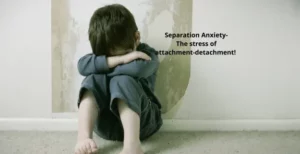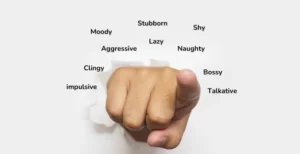‘Calm Down’ could be the most difficult soothing suggestion to hear and accept from someone after an emotional, social, or physical aftermath. Instead, people feel it aggravates the situation, is ineffective and is an attempt to distract, disrespect, and avoid validating the overwhelming feelings. ‘People become upset! ‘Calm down’ upsets people instead of making them feel better.
Technically, no one has ever calmed down after telling them to calm down…
..and it doesn’t work with children too! Telling a child to calm down by distracting or overinstructing could have a significant impact on the way they understand, process, and perceive emotions.
Why ‘calming down’ methods wouldn’t work on children?
Children largely function in the here-and-now moment. Most of their learning is focused on what is in front of them and hence are regarded as pure learners and mindful thinkers. According to this perspective of living in the present, their learnings, turmoils, tantrums, and hard emotions are real, genuine, and overwhelming. Very young children struggle to identify and process such emotions which naturally erupt, unknown to them. Within these difficult situations, telling a child to ‘calm down’, breaks the chain, adds to the confusion, and passes negative signals to their brain saying ‘this doesn’t require attention and this is not something that should happen to me!’
By the time they reach their teenage, the feelings could become intense and children could strongly retaliate when told to ‘calm down. The same could continue in adulthood.
Reasons why children shouldn’t be suggested to ‘Calm down!’
1. Repeatedly telling children to calm down is not only dismissive, but it’s essentially telling them that they don’t have permission to feel their emotions.
2. It could aggravate anxiety and anger.
3. It creates emotional confusion about whether to feel it, consider it or ignore it!
4. It could make them less empathetic when they see others around them experiencing a tantrum or hard emotions. They could struggle to offer support.
5. It eventually makes the child hide difficult and unpleasant emotions. They begin to explain to themselves that it wouldn’t be accepted or respected, and it is not important to share and talk about it to anyone. Further, they could learn to bottle up which could lead to adverse mental health concerns.
So, what could parents do instead of distracting them with a toy, making them laugh, overinstructing them to calm down or cracking a joke, or making funny faces?
Try these 5 ways!
1. Be around them physically, stick to them till the storm is passed.– A hug, holding hands, and embracing them could signal that they aren’t alone and they have all the support system around. It tells them they can rely on you!
2. Deeply listen.– Around 4 years of age, children can talk about the situation, and they could share what they are feeling, they may not exactly locate the cause, but they would love it if they are listened to. It indicates that they are attended to and treated well.
3. Offer support- The best way to begin is to ask what could you do? What do we do now? This could help after a few minutes of the difficult phase.
4. Avoid yelling at them, telling them it’s normal and that it happens to everyone, instead take it seriously. – Validate, accept and talk about it. Help them to label it, help them deal with emotions.
5. Provide an emotional toolkit- The best way to begin is to start talking about ‘What to do with these emotions? As a family, parents can set up sharing platforms, and also provide assurances that the family is a safe space to share.
One of the major components of emotional development is allowing free spaces and non-judgemental support. It is vital to understand here that emotions are important little messages and form a major part of growing up!
The best way forward to calm children down is to address it, rather than avoid it. One way is to say ‘Let’s face it’ rather than saying ‘Calm down!’
Cheers!






